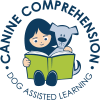
Our Blog
Training Therapy Dogs for School Settings

Across Australia, several organisations specialise in providing therapy dog training programs. These programs offer comprehensive training that covers various aspects of therapy dog work, including animal behaviour, human-animal interactions, and effective communication techniques. Training typically involves theoretical learning and hands-on experience, allowing handlers to develop essential skills in facilitating therapy sessions, managing group dynamics, and promoting emotional well-being. Additionally, training programs prioritise the welfare and safety of the therapy dogs and the individuals they interact with, ensuring that handlers have the knowledge and resources to provide optimal care and support. Through these organisations, aspiring therapy dog teams receive the guidance and expertise needed to make a meaningful difference in schools and other educational settings.
Canine Comprehension employs social workers, allied health professionals, and educators who have successfully completed such courses. We also offer our own training course to new recruits called the Pathway to Employment. This specifically designed course was written to meet the unique training needs of working with at-risk students in school settings and running the Canine Comprehension curriculum programs.
Here's a glimpse into what it takes to become a certified therapy dog team through our Pathway to Employment program:
Understanding Animal-Assisted Therapy (AAT):
Handlers begin their journey by immersing themselves in the principles and practices of Animal-Assisted Therapy (AAT). This understanding is crucial as they learn about the different types of AAT interventions, including Emotional Support Animals (ESA), Service/Assistance Animals, and Animal-Assisted Activities (AAA).
Acquiring Essential Skills:
Handlers undergo a rigorous training program to develop a range of essential skills. From effective communication and empathy to crisis management, they learn it all. They also learn to interpret canine behaviour, anticipate student needs, and respond appropriately to various situations, making them well-rounded professionals.
Comprehensive Education:
Handlers embark on a lifelong learning process on animal behaviour, learning theories, and best practices in AAT. They study the nuances of human-animal interactions and explore strategies for fostering positive relationships between therapy dogs and students.
Practical Experience:
Hands-on experience is a crucial component of the training process. Handlers work closely with experienced mentors and therapy dogs to gain practical skills in facilitating therapy sessions, managing group dynamics, and promoting emotional well-being.
Certification and Accreditation:
Upon completing the training program, handlers and their canine companions undergo rigorous assessments to obtain certification as therapy dog teams. Professionalism is paramount in training and deploying therapy dogs in school settings. Handlers are entrusted with the well-being of students and therapy dogs, requiring them to adhere to strict guidelines and ethical standards. They must prioritise the safety, health, and welfare of all parties involved and maintain high professionalism at all times.
Training Canine Comprehension therapy dogs for school settings is a meticulous process that demands handlers' dedication, expertise, and compassion. By investing in comprehensive training programs and upholding the highest standards of professionalism, we ensure that therapy dogs are well-equipped to impact students' lives positively.
If you would like to learn more about working for Canine Comprehension, click here.
